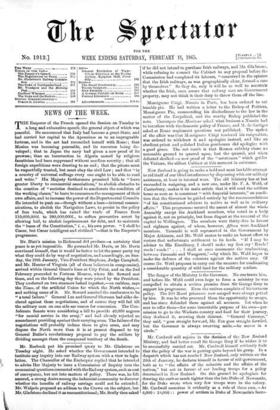Mr. Blair's mission to Richmond did produce—a certainty that peace
is as yet impossible. He persuaded Mr. Davis, or Mr. Davis convinced himself, that it would be better to let the peace party try what they could do by way of negotiation, and accordingly, on Sun- day, the 29th January, Vice-President Stephens, Judge Campbell, and Mr. Hunter of Virginia (all of them believers in compromise), arrived within General Grant's lines at City Point, and on the 2nd February proceeded to Fortress Monroe, where Mr. Seward met them, and on the following day they were joined by the President. They conferred on two steamers lashed together,—an emblem, says the Times, of the artificial Union for which the North wishes,— and nothing came of it. Mr. Seward asserted the conference to be " a total failure." General Lee and General Sherman had alike de- clared against these negotiations, and of course they will fail till the military men on one side see reason for concession. The Con- federate Senate were considering a bill to provide 40,000 negroes "for menial service in the army," and had already rejected an amendment providing against their carrying arms. The failure of the negotiations will probably induce them to give arms, and may dispose the North more than it is at present disposed to try General Butler's revolutionary proposal to pay the soldiers by dividing amongst them the conquered territory of the South.






























